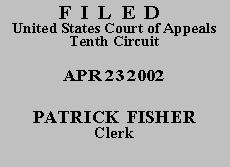

| PAULA G. LAND, Ph.D.,
Plaintiff - Appellant, v. SCOTTSDALE INSURANCE COMPANY, an Arizona corporation, Defendant - Appellee. |
|
Plaintiff Paula G. Land appeals from the grant of summary judgment to defendant Scottsdale Insurance Company on her claim that defendant wrongfully canceled her malpractice insurance policy. We have jurisdiction under 28 U.S.C. § 1291.
Plaintiff, a psychologist, was granted a license to practice in New Mexico in 1986. In July 1999, the state Board of Psychology Examiners ("Board") informed her that her license could be suspended or revoked based on a complaint filed with the Board by a former client. In October 1999, plaintiff applied to renew her malpractice insurance, noting on her application that a patient had filed a complaint against her in the past year. Defendant issued a one-year policy beginning December 1, 1999. On February 3, 2000, the Board ordered plaintiff to surrender her license and cease practicing within thirty days. Thus, her license was revoked as of March 4, 2000. Plaintiff secured a stay of the Board's decision on April 10, 2000, and was eventually successful in having her license reinstated. Defendant notified plaintiff on March 3, 2000, that it was canceling her insurance policy effective April 6, 2000, because her license had been revoked.
The magistrate judge decided this diversity case by consent of the parties. See 28 U.S.C. § 636(c). Considering the parties' cross-motions for summary judgment, the magistrate judge reasoned that the revocation of plaintiff's license substantially changed the risk assumed by defendant and was also based on plaintiff's willful and negligent acts or omissions. The magistrate judge concluded that defendant was justified in canceling plaintiff's insurance policy under New Mexico law, and was entitled to summary judgment.
We review the grant of summary judgment de novo, using the same standard applied by the magistrate judge. United States v. Distefano, 279 F.3d 1241, 1243 (10th Cir. 2002). Summary judgment is proper if the moving party shows that "there is no genuine issue as to any material fact and [it] is entitled to a judgment as a matter of law." Fed. R. Civ. P. 56(c). "When applying this standard, we view the evidence and draw reasonable inferences therefrom in the light most favorable to the nonmoving party." Distefano, 279 F.3d at 1243 (quotation omitted). Plaintiff argues on appeal that the cancellation of her insurance policy was wrongful because: (1) revocation of a professional license is not specifically listed as one of the statutory grounds for cancellation of an insurance policy; (2) the conduct underlying her former client's complaint occurred long before her insurance policy was renewed, she admitted the fact of the charge on her insurance application, and her alleged past misconduct could not substantially alter the risk assumed by defendant; and (3) she did not practice without a license and therefore did not increase the insured risk.
We have carefully reviewed the magistrate judge's decision in light of the parties' materials. We are unpersuaded by plaintiff's assertions of error, and affirm for substantially the same reasons as those set forth in the magistrate judge's September 19, 2001 Memorandum Opinion and Order.
AFFIRMED.
Entered for the Court
Senior Circuit Judge
*. This order and judgment is not binding precedent, except under the doctrines of law of the case, res judicata, and collateral estoppel. The court generally disfavors the citation of orders and judgments; nevertheless, an order and judgment may be cited under the terms and conditions of 10th Cir. R. 36.3.